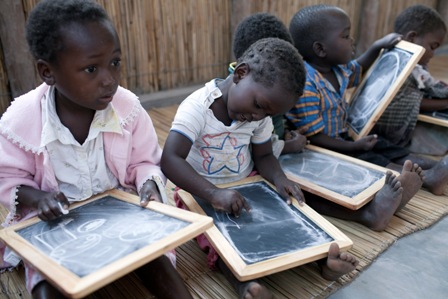
In just a few nail-biting weeks, American Idol fans will select a new winner and will change the course of someone's life.
American Idol viewers made a similar choice several years ago for Castera, Samuel and Pedro. Their names are not familiar to American Idol enthusiasts. They were never finalists in the televised singing competition. They live far from the spotlight. They don't even own a television, yet alone have electricity to power it. But Americans helped rewrite their future and thousands of preschoolers like them.
It was 2007, and Americans tuned into the first Idol Gives Back television charity special and dug deep into their pockets to give generously. With nearly one million dollars in donations, Save the Children, in partnership with the government of Mozambique and other local NGOs, launched one of the first preschool programs in rural Mozambique, a country in sub-Saharan Africa where HIV and AIDS have frayed the fabric of family life, leaving many young children parentless.
Driving off the main paved highway in Mozambique and down rutted dirt roads, it can take hours to reach any of the 30 villages where our preschool program began in 2008. There, in what feels like the middle of nowhere, you will hear the cackle of kids playing outside on the swings of their playground or see children writing the letter "a" on black slates while sitting on the floor in their classrooms made of reeds and straw.

Four years later, the results of the preschool program are in. And, it turns out all the preschoolers are winners. A recent World Bank study of Save the Children's preschool programs in Mozambique -- the first of its kind in Africa -- shows that preschoolers were 24 percent more likely to enroll in primary school and were significantly better equipped to learn than children not in preschool. How great is that? And, the study also finds that children going to preschool are much more likely to show interest in math and writing, recognize shapes and show respect for other children, than those not in preschool.
And, here's the kicker. Preschool benefited the preschoolers' families, too. The study finds that parents of enrolled children are 26 percent likelier to work, and older siblings are more likely to go to school themselves. And, for as little as about $2.50 a month per child in Mozambique, preschool is not only an affordable investment, it also reaps returns for years to come.
The value of getting early education boost cannot be understated. That's why this week, as part of the Global Campaign for Education's Global Action Week, advocates around the globe want to bring attention to early childhood programs and press the U.S. government to maintain funding for these critical basic education programs both in the U.S. and abroad. The stark truth is that for many children globally, early learning programs are still a luxury. Even here in the U.S., children living in poverty in rural areas have few options.
In Mozambique alone, only four percent of its nation's children under age 5 go to preschool. Before preschool came to their villages, children spent their days laboring in the field with their mothers, helping to cart water, pull weeds or chase the baboons away from the crops. Others were left at home alone to care for younger siblings or to entertain themselves, with no learning materials -- no crayons, no books, no toys -- or structured play.
Without a foundation of learning, children step into the classroom for the first time unprepared. It is like asking someone to sing a tune without the notes. They don't know where to start. They don't know how to piece it together. They have no coaches to help them. As a result, they quickly become overwhelmed. Many stop going to school in first or second grade, tragically shutting the door on learning and opportunity early in life. Early education is the track on which life-long learning is built. At preschool, children acquire social, motor and thinking skills, and build their knowledge of letters, words and numbers.
The dream of going to preschool will soon be within reach for many more children in Mozambique and throughout the African continent. The Mozambican government, encouraged by the World Bank findings, will bring early learning to more villages across the nation later this year. And, other African countries are studying the research results and seeing how they can copy the preschool program in their own countries.
For this, American Idol fans can take a bow. Thanks to them, African preschoolers will be poised to step out on the stage of school and life, and shine.
